
A SEMANTIC ANALYSIS OF AN ERECTILE DYSFUNCTION FORUM
Erectile dysfunction (ED) can be one of the most challenging health issues many men face – and it’s also one of the most common. Defined as the inability to get and maintain an erection, the condition can contribute to relationship problems, erode self-confidence, and cause untold stress. ED may also signal underlying health conditions, such as diabetes.
But though some men with ED may feel singled out, statistics show they are far from alone: Erectile dysfunction impacts an estimated half of men aged 40 to 70. And further research reveals that one in four men newly diagnosed with ED is less than 40 years old.
Many men who struggle with ED may not be comfortable discussing the issue with others. For these men, an online forum on the topic can be an invaluable source of advice, encouragement, and commiseration. To better understand the issues these men face, we analysed thousands of posts and comments on an erectile dysfunction forum. Here’s what we learned.
WORD FREQUENCY AND KEYNESS
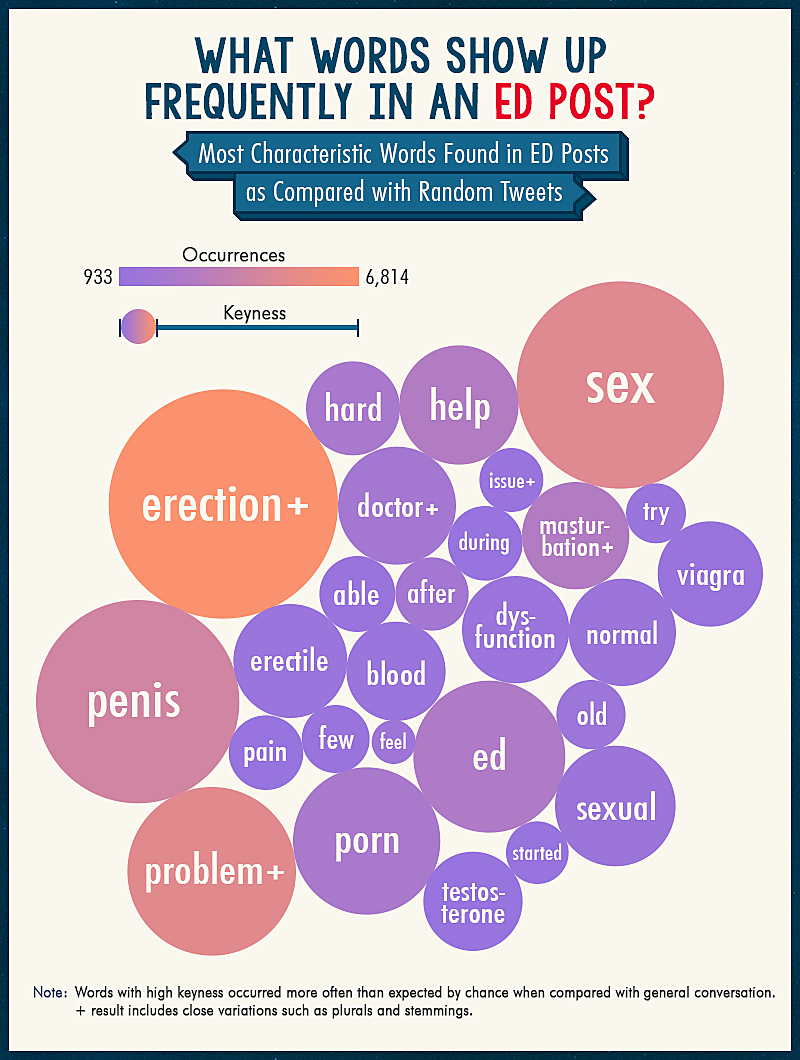
The erectile dysfunction forum we looked at featured various conversation topics. To get a handle on which subjects arise most, we looked at specific words within posts and compared their frequency with the frequency of their mentions in common conversation. (In this case, we used Twitter as the basis for common conversation.)
In the illustration above, the bubble colours represent frequency of mention in the forum itself, while the bubble size conveys each word’s “keyness” – its frequency when compared with common conversation, which reveals how “key” a keyword is within the forum’s content.
With almost 7,000 mentions in the forum, the word “erection” is highest both in mention frequency and keyness – it’s clearly not a word that comes up often in everyday conversation.
Other words that are both key to forum content and mentioned frequently include “sex,” “penis,” “problem,” “ED,” and “porn.” The words “penis” and “sex” are similar in keyness, but posters wrote the word “sex” nearly 700 more times.
The word “problem” is more typical of everyday conversation, so although it is mentioned more than “sex” or “penis,” it has a lower keyness rating. Other common words – “hard,” “help,” and “able” – show up on the keyness scale, meaning they are mentioned unusually often within the forum.
AGE OF FORUM PARTICIPANTS

To get an idea of forum participants’ ages, we tabulated posts whose authors indicated their age. Surprisingly, although erectile dysfunction is generally considered a condition that strikes older men, nearly six out of 10 participants are 24 or younger. And only around 20% of participants are age 31 and above.
Is this simply because younger people are more likely to visit online forums? (After all, around half of Internet users worldwide are 34 or younger.) Or does the uneven age breakdown actually underscore the concerning statistic indicating an increase in ED diagnosis of young men? Perhaps it’s a combination of the factors.
WORDS FOUND NEAR DRUG NAMES

Some men take prescription drugs to treat their erectile dysfunction – most commonly, Viagra, Cialis, and Levitra. While all three increase blood flow to the penis to help facilitate erection, the drugs vary somewhat in cost and side effects.
To see what forum participants are saying about each, we examined words located near prescription drug names – specifically, within five words to the before or after.
Mentions of “Viagra” pair foremost with “Pfizer” (its brand) and the word “generic.” The generic version of Viagra is known as sildenafil and has been available in the UK since 2013.
“Cialis” mentions most often go hand in hand with “Levitra,” revealing that many users may be comparing the two. And both “Cialis” and “Levitra” come up alongside discussion of “PDE” and “inhibitors.” (PDE inhibitors are drugs that block PDE5, which is the enzyme that breaks down chemicals that help you get an erection.) Presumably, these users are discussing the function of the medications.
WORDS FOUND NEAR THE WORD “PENIS”
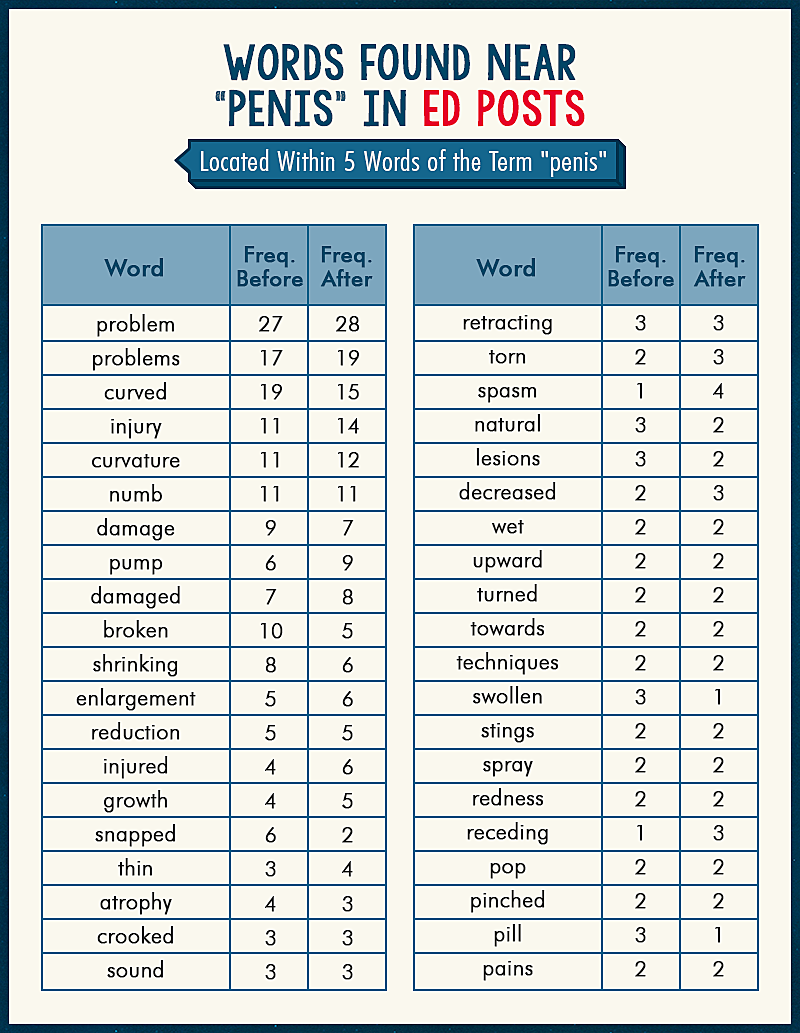
To get to the heart of conversation, we examined which words are commonly located near the term “penis.” The top mention? The words “problem” and “problems.” Next come “curved,” “injury,” and “curvature,” indicating that forum users may be discussing “curvature of the penis” or Peyronie’s disease, which may possibly be caused by injuries during sex.
Other disconcerting mentions include terms such as “numb,” “damage,” “broken,” snapped,” and “sound” – indicating that injury to the penis can be a more common occurrence than one might expect. Men are also more likely to sustain such injuries if they have priapism or prolonged erections caused by taking Viagra.
FREQUENCY OF DRUG MENTIONS OVER TIME
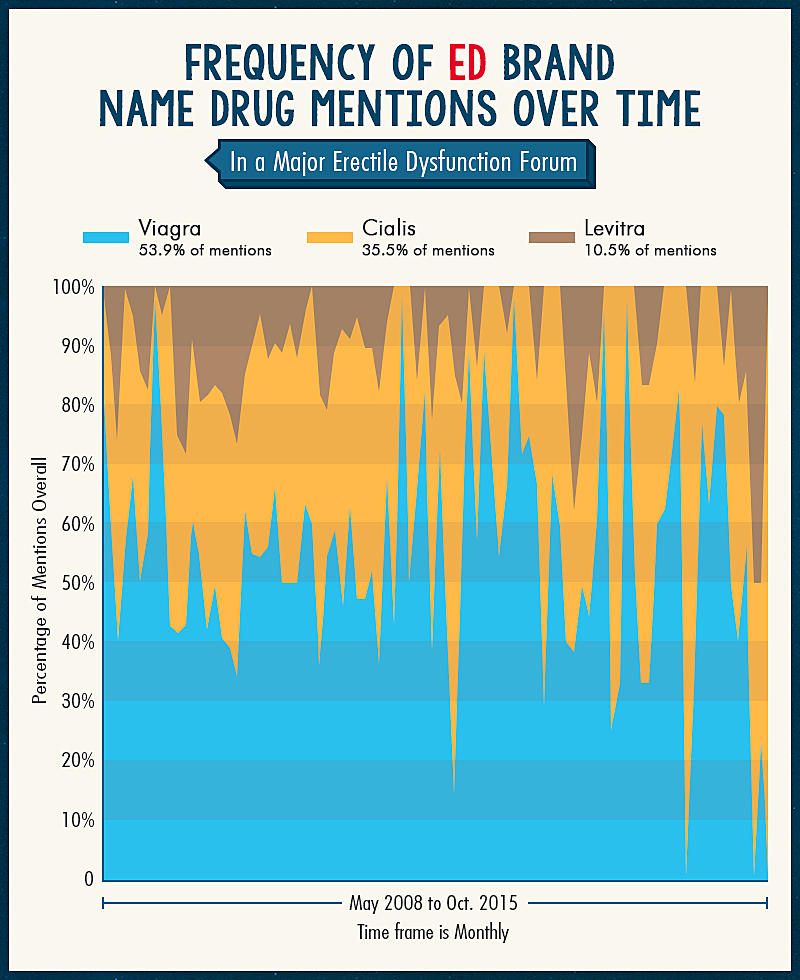
Tracking the mentions of top prescription ED drugs over a seven-year period lends insight into the popularity of Viagra, Cialis, and Levitra. Viagra draws the most mentions during nearly every month – garnering nearly 54% of drug mentions. Cialis comes in second, claiming almost 36% of mentions. Levitra makes up only 10% of drug name mentions.
MECHANICS: NUMBER OF MENTIONS OF TOP WORDS AND PHRASES
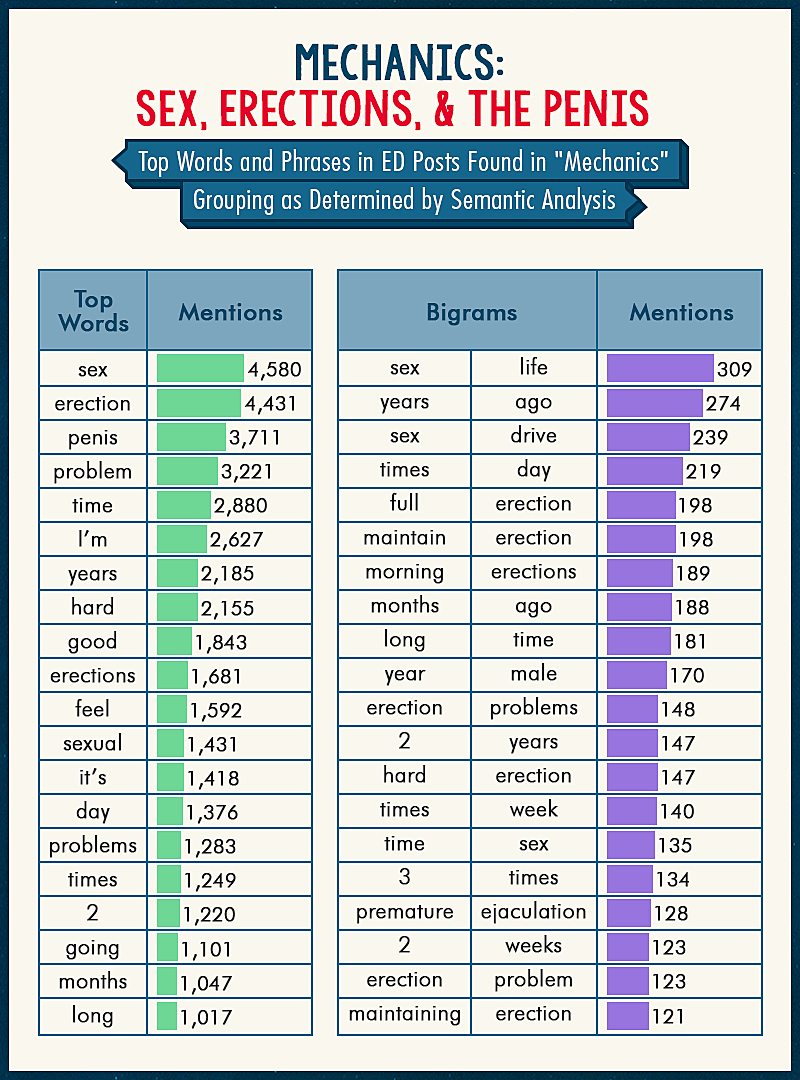
When it comes to mechanics issues, the most frequently mentioned words include “sex” (with a whopping 4,580 mentions), “erection” (4,431), “penis” (3,711), and “problem” (3,221). Words about time frames abound – “time,” “day,” “months,” – signifying that in many of these cases, forum participants post anecdotes about the challenge they face, in hopes of receiving advice or commiseration: “Hello, I’m 24 years old and have been struggling with erections for the last 2 years,” one forum user writes.
Top two-word phrases include “sex life,” “years ago,” “sex drive,” “times [a] day,” and “full erection.” “Two years ago I had an incident,” one 20-year-old man writes. “As I was about to achieve full erection something kinda snaps … I’m scared that I might have fractured my penis.”
HEALTH CARE: NUMBER OF MENTIONS OF TOP WORDS AND PHRASES
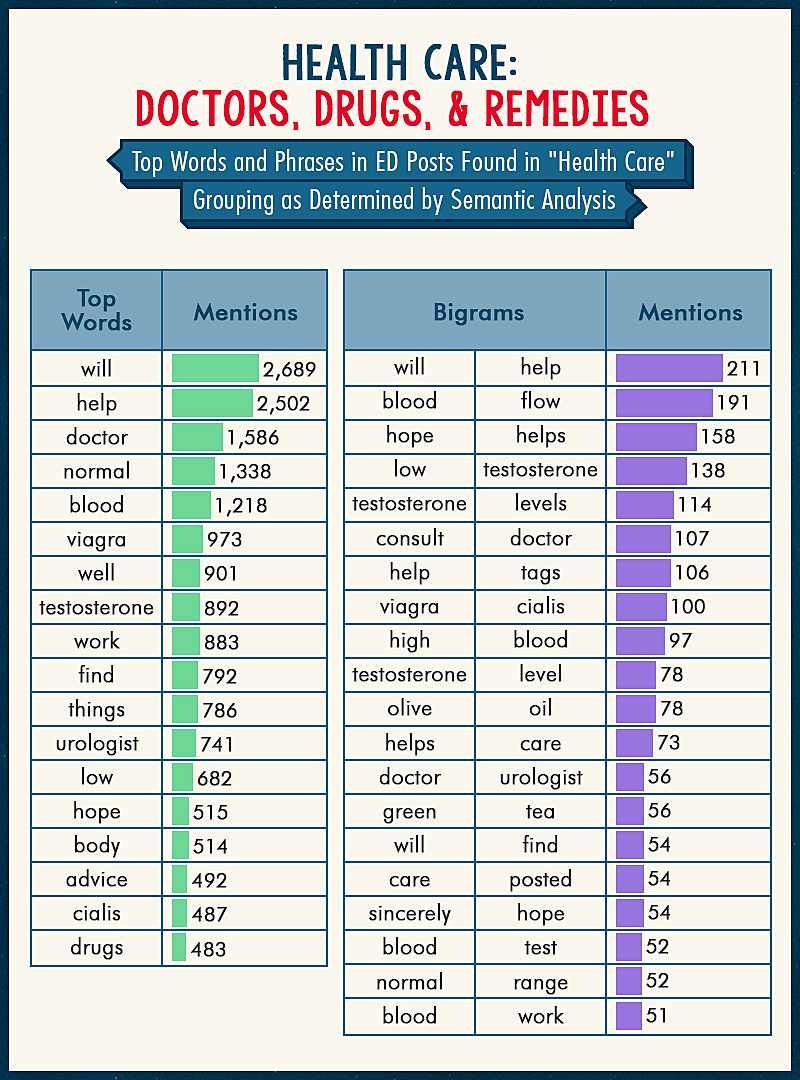
The words above represent the medical side of ED: “will” and “help” come out on top, followed by “doctor,” “normal,” and “blood.” Other terms include “viagra,” “urologist,” and “drugs,” among others. “My urologist does not spend enough time with me and I don’t think he is testing me correctly,” one man writes in a post asking for doctor recommendations.
Though focused on the topic of health care, the word pairings paint a poignant picture of men seeking assistance: “Will help,” and “hope helps” come up frequently, along with “sincerely hope.” The phrases also convey purely medical topics: “blood flow,” “low testosterone,” “high blood,” and “normal range.” “My doctor has put me on high blood pressure pills, since then I have not been able to get a erection,” one man writes.
MENTAL HEALTH: NUMBER OF MENTIONS OF TOP WORDS AND PHRASES
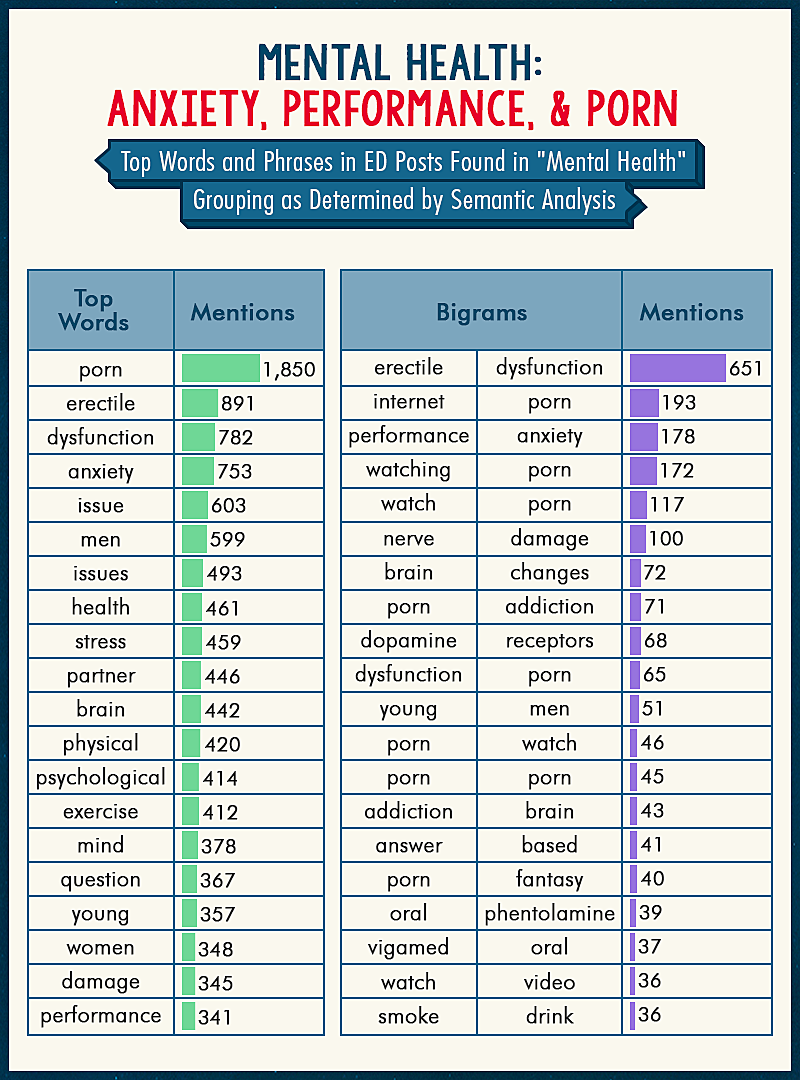
The above words are commonly linked with the mental aspect of ED. Common terms include “porn” (which is mentioned more than twice as often as second most–common phrase),“anxiety,” “issue,” “psychological,” and “stress.” One real-life example: “I find it hard to believe that my condition can be chalked up to anxiety or something along those lines,” writes a commenter who says he has trouble achieving erections. “Does anyone have any suggestions on tests I should have done?”
The most common phrase is “erectile dysfunction” – which is mentioned more than three times as often as any other phrase – followed by “internet porn,” “performance anxiety,” and “watching porn.” Clearly, porn is a frequently discussed subject: “I have been viewing internet pornography frequently (4 to 5 times a week) for the past 6 years,” one man writes. “I am in my mid-20s and have had a problem getting and maintaining an erection with sexual partners since my late teens when I first started looking at internet porn.”
Conclusion
Erectile dysfunction may not be a topic that comes up frequently among friends and family. But as our research reveals, many people affected by ED are going online to find information and support.
Our examination of ED forum posts revealed a few surprises: Though erectile dysfunction is often considered an issue exclusive to older men, ED forum participants are quite young on the whole. Forum participants open up about deep-seated and personal issues: reliance on porn, injuries to the penis, and a plethora of frustrating and mysterious symptoms.
Are you facing a medical condition? The Internet can be an invaluable resource. Joining a recognised online forum on a registered medical website is a good way to connect with others who struggle with the same condition. And turning to a registered medical website or reputable online doctor is an excellent way to get reliable advice and answers from the comfort of home.
Superdrug Online Doctor commissioned this study in order to better understand ED forums and the people who visit them. If you are experiencing a challenge such as erectile dysfunction, know you’re not alone. Superdrug Online Doctor features a team of GMC-registered providers available for consultations and advice. Get answers to your most difficult and sensitive questions – no visit to the GP required. Depending on your preference, you can communicate online or over the telephone, treatments are discreetly delivered directly to your home.
Methodology
This project analysed 3,311 primary posts and 4,524 comments made on MedHelp.org ED Forum from July 2007 to October 2015 by 3,962 unique posters.
The network graph view was built from the primary posts and comments in the Medhelp Forum.. They were modeled in Gephi for clustering (modularity) and layout and then rendered in SigmaJS for the explorable, interactive web page version.
The keyness analysis and collocation analysis (words near drug brand names and the term “penis”) were performed using AntConc.
“Keyness” refers to the quality of a word or phrase in terms of being “key” to context. Words with high keyness occur more often in text than expected to by chance in a reference corpus – in this case, a set of 250K random tweets. “Collocation” refers to the juxtaposition of a specific word with another word with a frequency level greater than chance.
Sources
- Erectile Dysfunction, Mayo Clinic, 2015
- https://www.mayoclinic.org/diseases-conditions/erectile-dysfunction/symptoms-causes/syc-20355776
- Erectile Dysfunction, Cleveland Clinic, 2012
- https://www.clevelandclinicmeded.com/medicalpubs/diseasemanagement/endocrinology/erectile-dysfunction/
- Which Drug for Erectile Dysfunction?, Harvard Health Publications, 2014
- https://www.health.harvard.edu/mens-health/which-drug-for-erectile-dysfunction
- Report: Viagra Doesn't Cause Melanoma but the Viagra Lifestyle Might, Forbes, 2015
- https://www.forbes.com/sites/arleneweintraub/2015/06/23/report-viagra-doesnt-cause-melanoma-but-the-viagra-lifestyle-might/
- Casey: At $40 a Pill, Viagra’s No Cheap Thrill, The Roanoke Times, 2014
- https://roanoke.com/news/columns_and_blogs/columns/dan_casey/casey-at-a-pill-viagra-s-no-cheap-thrill/article_c26cdad5-c1f6-5b85-9ed0-1ae28baa5638.html
- Distribution of Internet Users Worldwide by Age Group, Statistica, 2014
- https://www.statista.com/statistics/272365/age-distribution-of-internet-users-worldwide/
- Stress Management, Mayo Clinic, 2015
- https://www.mayoclinic.org/healthy-lifestyle/stress-management/in-depth/support-groups/art-20044655
Tools
- AntConc: Anthony, L. (2014). AntConc (Version 3.4.4w). Tokyo, Japan: Waseda University. Available from https://www.laurenceanthony.net/software/antconc/
- SigmaJS: https://www.sigmajs.org/
- Gephi: https://gephi.org/
Fair use
We grant permission to repost the images found on this page. When doing so, we ask that you kindly attribute by linking to onlinedoctor.superdrug.com and this page so your readers can learn more about the project and its methodology.